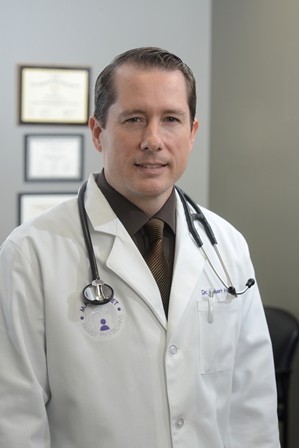For many people, the holiday season represents a time of joy celebrated by gatherings with friends and loved ones. But for others, it sparks sadness or stress, and it can bring on something even more serious.
 “During the winter months, two of the most common mental health issues we see are anxiety and holiday depression,” family physician Robert Holtz, D.O., of Main Street Family Physicians, a Texas Health Physicians Group practice, said. “Sometimes people think depression is temporary, that’s it’s a sadness that will pass after a while. On the contrary, for many people, depression is a serious mental health condition that requires professional help.”
“During the winter months, two of the most common mental health issues we see are anxiety and holiday depression,” family physician Robert Holtz, D.O., of Main Street Family Physicians, a Texas Health Physicians Group practice, said. “Sometimes people think depression is temporary, that’s it’s a sadness that will pass after a while. On the contrary, for many people, depression is a serious mental health condition that requires professional help.”
Because it can be a serious problem, it’s important to be familiar with the signs and symptoms that may signal depression: feelings of guilt or worthlessness, irritability, loss of appetite, weight gain/loss, and changes in sleep, energy and concentration. During the holiday season, these are often caused by unrealistic expectations, financial pressures or old memories of deceased friends and loved ones. For some, family reunions also can be stressful situations.
While professional help is indicated for those experiencing several of these symptoms for two weeks or more, a call to your primary care physician should be the first step in getting help.
“If you want to improve your state of mind and overall well-being, it’s most important to increase your awareness,” Holtz said. “The best thing you can do if you’re worried about yourself or a loved one is ask a physician for help.”
One of the more common causes of “winter depression” is a condition called seasonal affective disorder (SAD), which is often associated with a vitamin D deficiency as a result of diminished exposure to sunlight, Holtz said. Mental Health America estimates that SAD affects half a million people every winter between September and April, peaking in December, January and February. The “winter blues,” a milder form of SAD, may affect even more people.
There is a clear distinction, however, between having the holiday blues and suffering from clinical depression, Holtz said. You should consider seeking professional medical help if your stress becomes all-consuming and you begin feeling persistent anxiety or depression. A professional can best evaluate your symptoms and recommend appropriate treatments. Psychotherapy, behavioral therapy, light therapy and stress-reduction techniques can help people cope with depression and anxiety, and prevent serious consequences.
Some individuals are more vulnerable than others, but people of all ages, races and circumstances are susceptible to depression. So it’s important for everyone to remember the basics of maintaining a healthy lifestyle: “Eat healthy foods, make sure you’re getting a lot of rest and exercising regularly, avoid alcohol and smoking, and keep reasonable expectations,” Holtz said. “Your mental health also can benefit when you integrate yourself into a community, whether that’s family or friends, church groups or social clubs.”
While it’s critical to know there are a number of resources available, most people go first to where they feel most comfortable seeking help: their primary care physicians.
“It’s not uncommon for people to suffer from depression,” Holtz said, “but it’s essential to identify it early and provide the proper treatment to them. Only then can we prevent serious mental health conditions. Your doctor is a very good place to start.”
To schedule an appointment with Dr. Robert Holtz, call 214-387-4073 or click here. Main Street Family Physicians is located at 5858 W. Main St., Suite 130, in Frisco.
About Texas Health Physicians Group
Texas Health Physicians Group is Texas Health Resources’ 501(a) not-for-profit physician organization based in Arlington. The group includes more than 840 physicians, physician assistants, nurse practitioners and medical professionals dedicated to providing safe, quality care for our patients. In addition to our primary and specialty practices, the organization’s network includes sleep lab services, infusion services, and diagnostic imaging in more than 230 locations in Collin, Dallas, Denton, Johnson, Parker and Tarrant counties. Physicians employed by Texas Health Physicians Group practice independently and are not employees of the hospital or Texas Health Resources.
About Texas Health Resources
Texas Health Resources is one of the largest faith-based, nonprofit health systems in the United States. The health system includes 25 acute care and short-stay hospitals that are owned, operated, joint-ventured or affiliated with Texas Health Resources. It includes the Texas Health Presbyterian, Texas Health Arlington Memorial, Texas Health Harris Methodist and Texas Health Huguley Hospitals, Texas Health Physicians Group, outpatient facilities, behavioral health and home health, preventive and fitness services, and an organization for medical research and education. For more information about Texas Health Resources, call 1-877-THR-WELL, or visit TexasHealth.org.